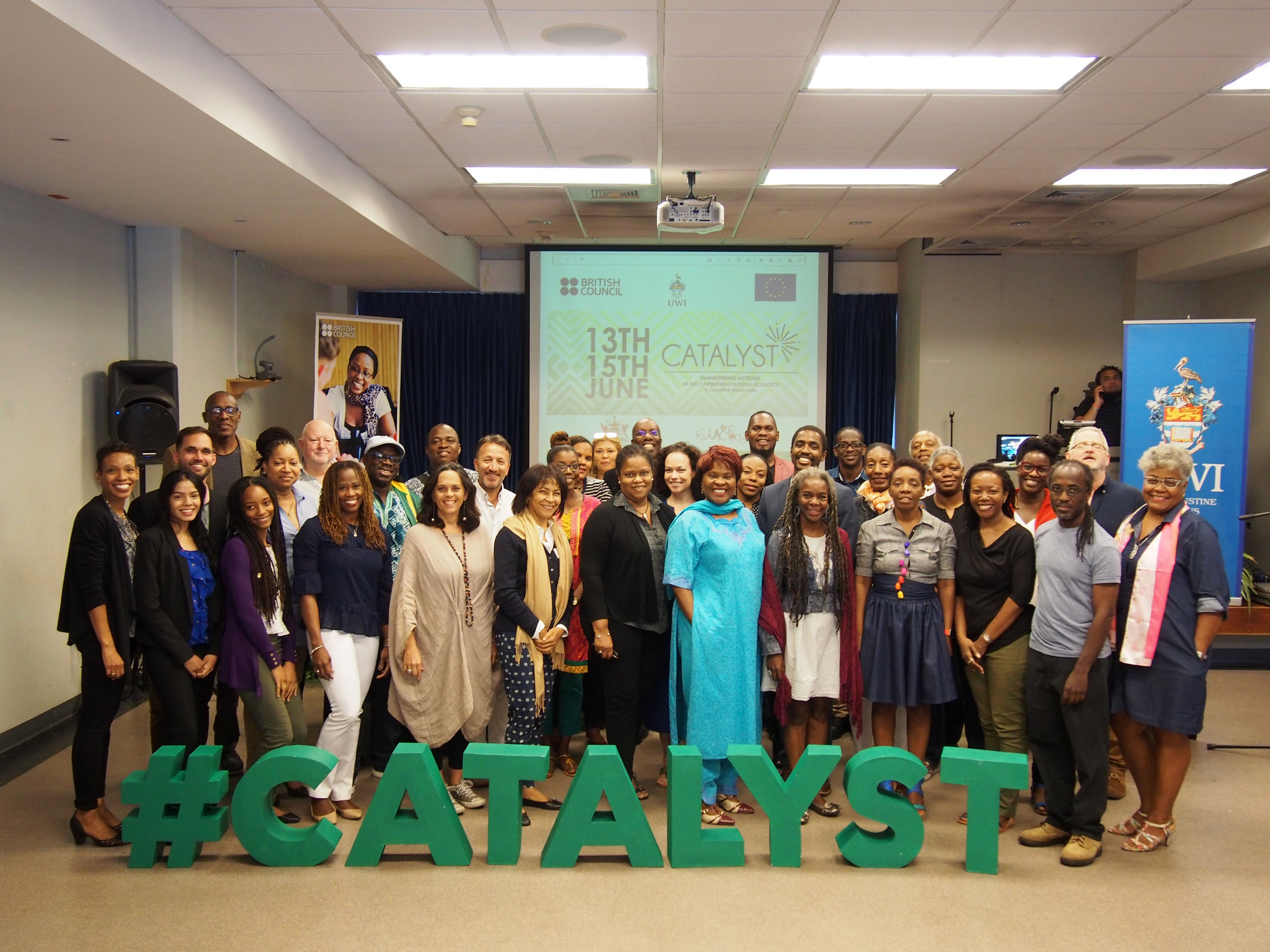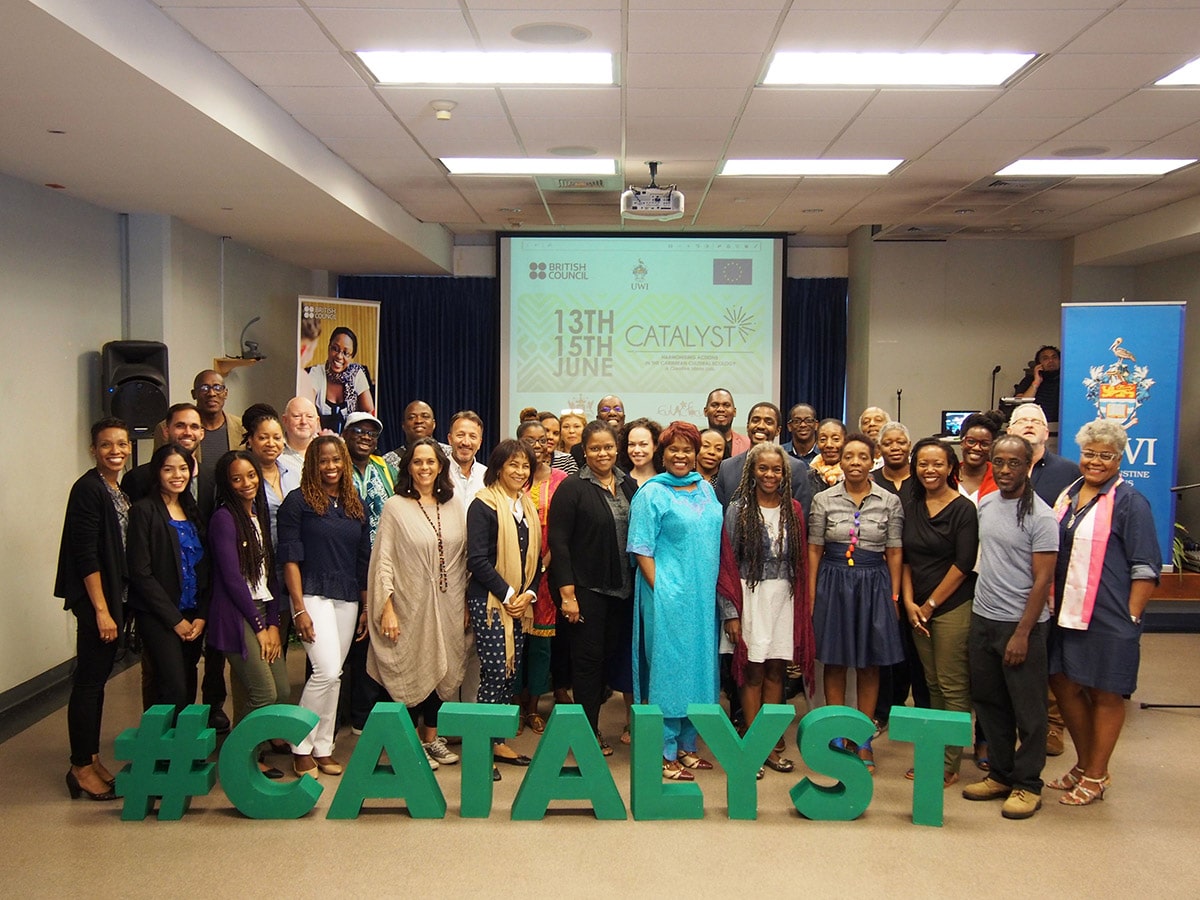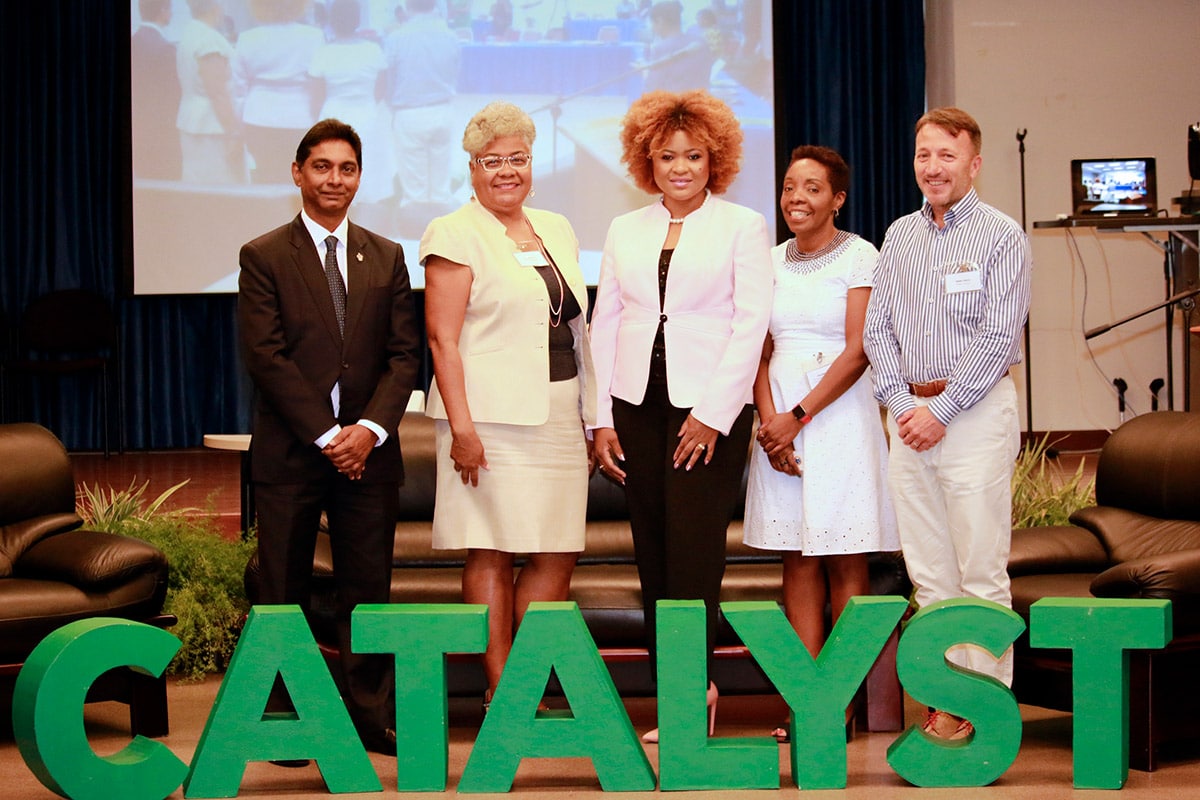
NAGB hailed as flagship institution in the region
by Holly Bynoe
On Wednesday, June 13th, through Friday, June 15th, over 40 key stakeholders from 10 countries across the Caribbean region and the UK convened at the University of the West Indies, St. Augustine campus in Trinidad to speak about the advancement, challenges and problematics of our regional creative ecologies. The British Council in partnership with the University of the West Indies held this three-day Ideas Lab workshop with the aims to harmonise cultural activity in the region, by highlighting the cultural, scientific and social dimensions of cooperation between the European Union (EU) and the Caribbean. The convening was funded by The British Council, The EU LAC Focus Project, The University of the West Indies as well as the Ministry of Community Development, Culture and the Arts.

Group shot of CATALYST participants and stakeholders. All Images courtesy of Vishala Jabar.
Bringing key policymakers, speakers, creative practitioners, festival organisers, academics, representatives from donor agencies, independent consultants, and others speakers, “CATALYST: Harmonising Actions in the Caribbean Creative Ecology” identified the need to enhance the shared vision between the EU and the Caribbean through sharing research, activities and learning from best-practices.
With the Orange Economy shifting the global relevance of culture and art, and with The Bahamas positioning itself to be a pilot and the leader in the region for culture and the creative economy, the acknowledgement of robust and catalysing initiatives on the ground are essential as an anchor and a hinge from which we must continuously pivot to ascertain our needs and their relevance to our spaces.
The leading project spearheading the way in The Bahamas is Creative Nassau, which was formed in 2008 by the late Jackson Burnside along with a group of passionate Bahamians who wished to showcase our unique culture to the world, whilst actively developing a Creative Tourism model to ensure that by the year 2020 more persons will travel to The Bahamas to experience its art, culture and heritage rather than just its sun, sand and sea.
We are two years away from this landmark moment, and we acknowledge the work that pushes us forward to get us to that mark. We also are made aware that cohering the actions to cohere is a hard word and doing it alone in a silo or vacuum might impede progress or damage how we get there. For the National Art Gallery of The Bahamas to be invited to take a seat at the table that CATALYST so graciously invited us to was a provocative moment in the context of having been privy to have a seat at other kinds of tables; tables that consider the colonial structure of funding but don’t pressure or agitate bodies to think about how these keeps us within an exploitative structure binding us to repeating systems and the monstrous challenge of being engaged in conversations and or projects that do not occur naturally and organically.
This kind of imposition shifts the crux of these meetings and often leaving us drained, hopeless and without a clear understanding of the actions that we need to collaborate on. Working intra-regionally will allow us to shift, innovate and evolve our spaces. These moments of encounter with each other are so deeply transformative and rewarding–as they draw affinities to the surface–that we are given a chance to learn from each other and make the further clarification as to how we want our national spaces to evolve.
The convening followed a typical structure, in which presentations were given by a diverse group of professionals from donor agencies, directors of cultures, practitioners, researchers, etc., and, at the end of the first two days, a summary was presented and we were asked to think critically about the ways in which we wanted to contribute to and extend this long-standing conversation. On the last day, we had several open group discussions where the methodology of the “Ideas Lab” entered. We were guided to generate questions, isolate problems and blockade and converse based on the conditions that we work in, in our broader experiences within the sector.
This was a pivotal moment, as it provided a deep approach to engage freely with the concerns and problems we have within our developmental structures. There were certain stipulations and limitations as with these conversations it is easy to sink into despair and for it to be a ground for complaint and scorn. However, with powerful bodies like CARICOM, the Caribbean Development Bank, EU liaisons and CARIFESTA in the room, it was clear that this face-to-face contact with key agents and agitators was one that wasn’t in any way demure, well behaved or typical.
In the picture ‘CATALYST Opening II’, standing from left to right: Indar Ramnarine – Deputy Principal, The UWI, St. Augustine, Professor Paula Morgan – Dept. Literary, Cultural and Communication Studies, Dr. Suzanne Burke – Dept. Literary, Cultural and Communication Studies, Dr. The Honourable Nyan Gadsby Dolly – Minister, Community Development, Culture and the Arts, Simon Dancey – Director for Cultural Skills – The British Council.
This difference was certainly established by the core leadership of CATALYST which included Dr Suzanne Burke, Lecturer in Cultural Studies at the UWI, St. Augustine Campus and Annalee Davis, former Caribbean Arts Manager for the British Council driving the outward direction and container of CATALYST. Given the intersections between academia and on the ground advocacy sensibilities that Davis has worked with for the last 20 years, this meeting of minds and spirits helped to shape an alternative and more productive space where issues of our postcolonial spaces were dissected and analysed, which was a sensible mechanism to facilitate a purposeful reading of the cultural Caribbean space.
With healthy ecologies being the buzzword, another stark but important realisation was made, highlighted and analysed. The ambivalence that local communities feel towards these governing bodies, the historical trauma around development and poor governance, position one element at the core of our current dilemma, and this was position one element at the core of our current dilemma – mistrust or the lack of trust across all of our social and cultural spaces. This harkens back to the historical rootedness and how colonisation has shaped our legislation, landscape and in many ways or legitimacy as subjects.
With this understanding, there was a moment—or several moments—of vulnerability, where funding and money took a backseat to the more significant driver of our (dis)eased space. This seemed to be a revelation to many in the room. Not so much that the lack of trust continues to erode progress and innovation, but the ways in which this lack of trust continued to emerge in conversations.

Participant, Annalee C. Babb, Independent Consultant from Barbados presented the most radical but practical of ideas, highlighting the human element within all of these relationships, collaborations and exchanges, along with the fact that creative spirits requires a give and take and a certain freedom to rail against the system. This kind of revolutionary thinking has paved the way for many movements within art and it is something that we need to clarify for ourselves as we can easily be seen as too comfortable in our bubbles.
This parity and acknowledgement of humanity is something that breaks first within our postcolonial societies. It becomes a place where we build walls up to keep people out and we reinforce elitist spaces and privilege. In these silos, we harbour an infestation of incestuous behaviour and turn our backs on self-critique. Within these silos, we also engage in a kind of lazy thinking and reinforce an ”iron cage “ of culture. We take something that should give certain freedom and something truly radical and we try to place boundaries and holds on it rather than giving it the kind of wildness it needs to challenge itself and to naturally evolve into an entity with a kind of transgressive quality.
This is the culture that we need to cultivate and thrive in. Our key stakeholders need to engage with the truth of our spaces in order to soothe and heal the damage done by decades of management and abuse. It is also hard to accept that sometimes these relationships are too broken to be remedied. However, within our space, as we work to clarify and act on the knowledge that we have, we need to make more room for our traumas and to rebuild trust. It may sound a lot like therapy, and the fact is that the disrepair needs that much work and attention paid to its health and sustainability.
At the end of the three days, planning and accountability came to the forefront of the conversation; emails were exchanged, collaborations and working groups set, with four sectors coming to the forefront that the group will look at and work towards for the coming year.
These include, the development of a grant writing support system to build a cadre of writers in the Caribbean with a focus on procuring grants for cultural programmes, initiatives and projects, and making this system less opaque to the people who would benefit from these resources; working to clarify an observatory with satellite locations and ambassadors that can look at the Caribbean in a cross and intersectional manner to draw practical local data from the various sub-sectors so that we aren’t working in infinite emptiness for decades to come; developing a series of podcasts interviewing a cross section of stakeholders in order to have an archive that fulfills the purposes of knowledge transfer and finally deepening the tendrils of UWI’s research including evaluating the efficacy of international donor aid to the Caribbean’s cultural sector.
To say that we left fired up from this meeting of minds is an understatement. To understand that the National Art Gallery of The Bahamas–our people’s museum–was noted as THE flagship cultural institution in the Caribbean and a model to look at is something to be genuinely proud of. That kind of affirmation makes us more resilient, tactical and nimble with our actions and social engagement.
CATALYST participants, top row: Marcel Pinas from Tembe Art Studios in Suriname; Sean Leonard, Alice Yard, Trinidad; Marvin George, Jouvay Ayiti, Trinidad/Jamaica; Moderator – Annalee Davis, Barbados; Holly Bynoe, The National Art Gallery of The Bahamas, The Bahamas and Marina Salandy-Brown, Bocas Lit Festival, Trinidad and Toabgo. ROUNDTABLE 1, the conversation with creative practitioners and activists who have shifted the cultural landscape through their work.
To be supported in this work in such a productive and intentional manner gave us all the encouragement needed to see how our Caribbean can function if we can work to infect and bring back to health the systems of control that we work within.
As Caribbean people, we are as nimble as our culture, at times we forget that we are not passive receptors of someone else’s projection of us and to end, It is reminiscent of the late iconic Puerto Rican artist Felix Gonzalez-Torres’ conversation with Joseph Kosuth “I want to be like a virus that belongs to the institution. All the ideological apparatuses are, in other words, replicating themselves; because that is the way the culture works. So if I function as a virus, an impostor, an infiltrator, I will always replicate myself together with those institutions. And I think that maybe I’m embracing those institutions which before I would have rejected”.
As we, in The Bahamas, move forward to define our National Development Plan for 2040 and as the Over-the-Hill redevelopment project takes shape, let us remember that we don’t need to rest on our laurels of comfort and complacency and as Caribbean people we exist like water having the ability to move around obstacles, to shapeshift and to transform. The Martinican poet and philosopher, Edourad Glissant, spoke of a rhizome—a type of powerful lateral-growing root system—and, just like this, we are able to move underground into the subterranean and sprout new growth to transform and shift our spaces. To be innovative, excellent and meet the magic and intensity of our creative minds let’s put courage, truth and integrity as the values by which we measure all of our actions.
Then and only then, might we come to see and exist in a space where we can thrive, flourish and bloom.